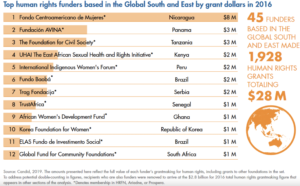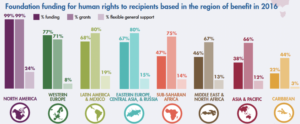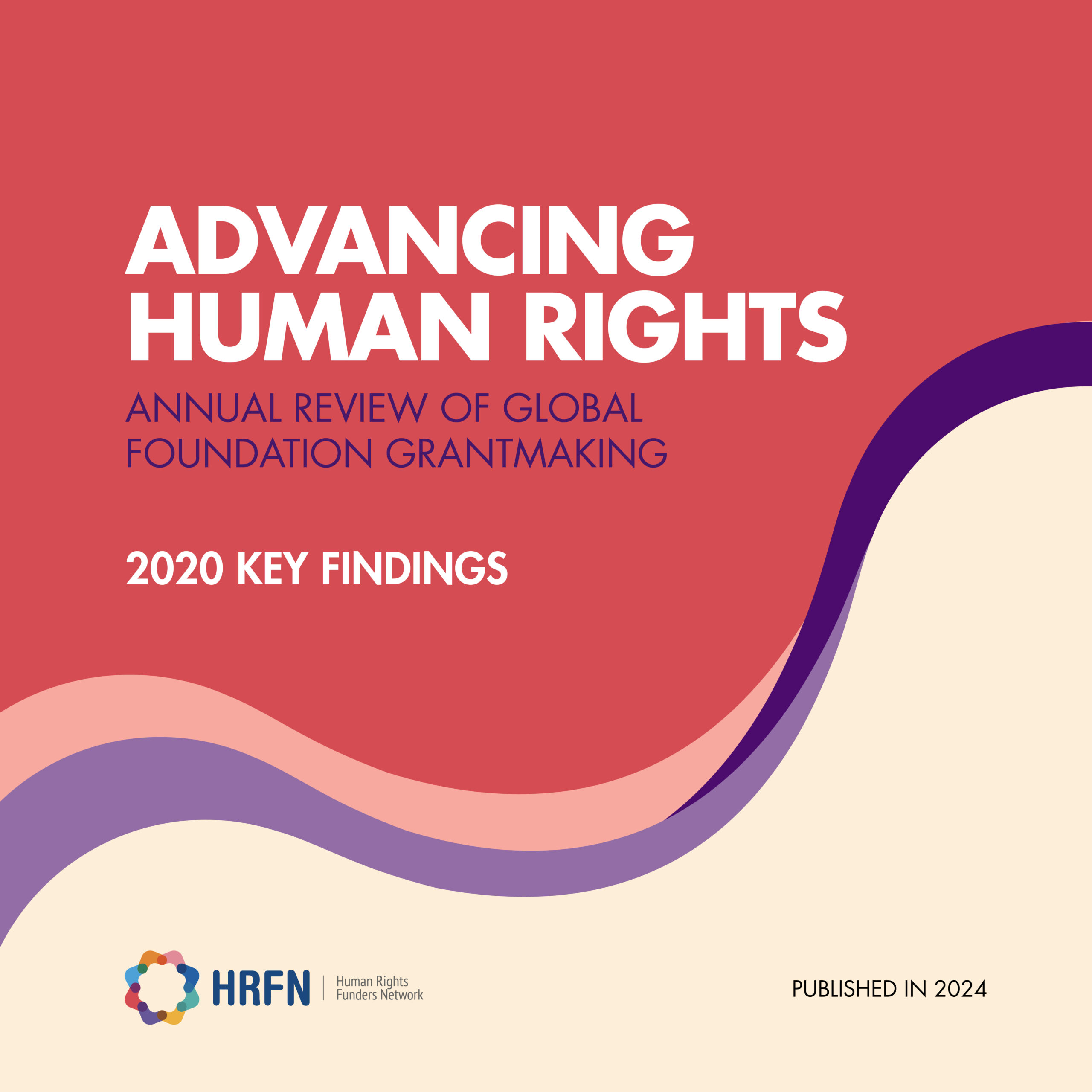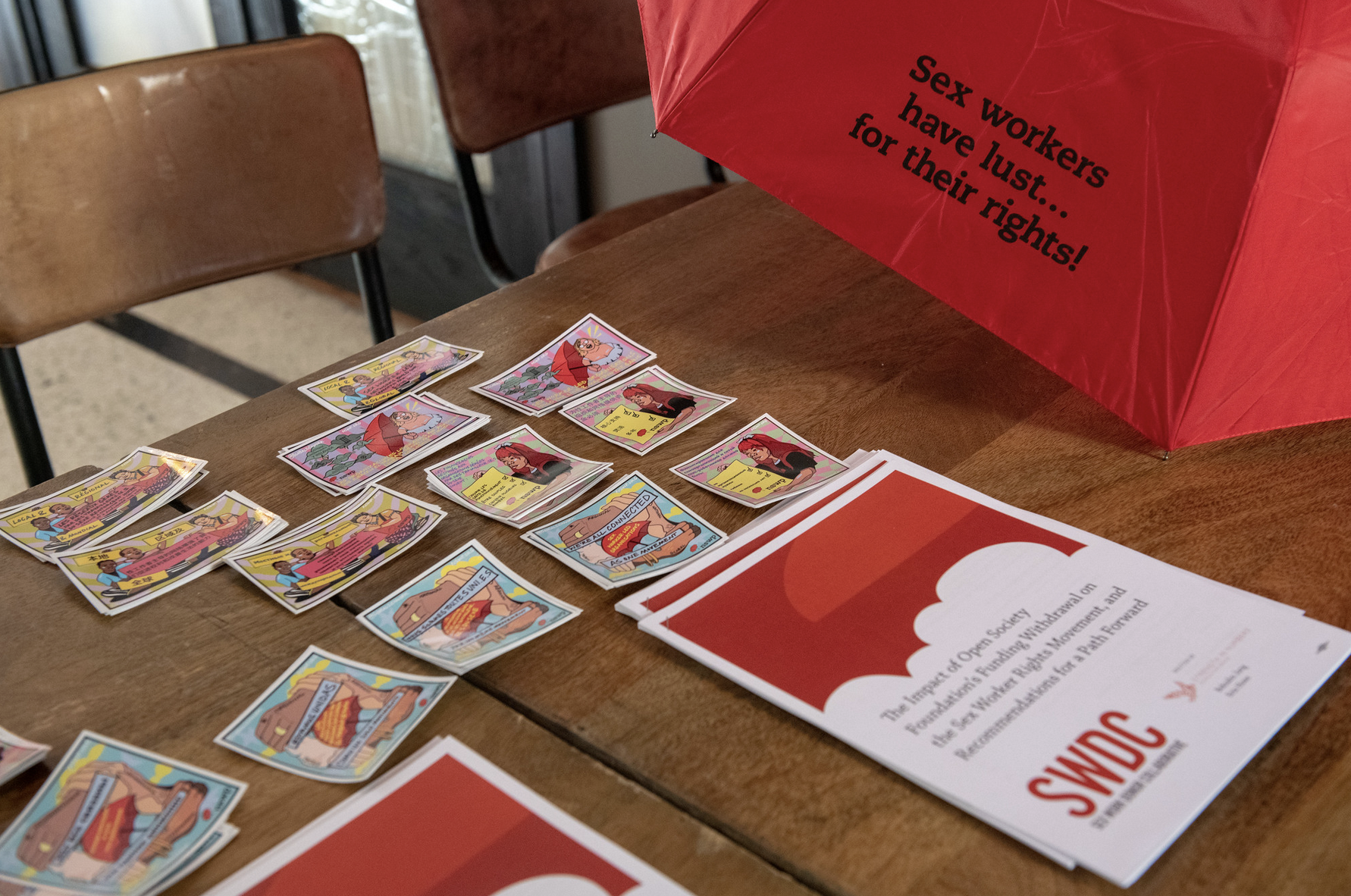By Rachel Thomas at Human Rights Funders Network

Human rights donors based in the Global South and East play a critical role, not only in their communities, but in the ways they inform the priorities and approaches of human rights philanthropy. While our Advancing Human Rights research has traditionally highlighted the largest human rights donors (by grant dollars awarded), our latest report also recognizes the top human rights funders based in the Global South and East. We asked foundations on that list, including the Global Fund for Community Foundations (GFCF) in South Africa and UHAI–the East African Sexual Health and Rights Initiative (UHAI EASHRI) in Kenya, to share their views on human rights funding. Here’s an excerpt of their insights, including their call for more flexible funding to locally-based organizations–a concern that’s supported by findings from our research.
For you, what sets human rights grantmaking apart from other types of philanthropy?
“The personal aspect of the work. For many working in human rights organizations, the issues they are fighting or responding to often affect them daily. It is vital to remember that many human rights defenders are putting their own safety (as well as the safety of their colleagues and families) on the line daily to get their work done. One need only think of environmental defenders in Latin America to understand just how personal–and fraught with risk–this work is.” – Wendy Richardson, GFCF
“Human Rights grantmaking recognises the intersections between lived human experiences and state obligations. As such, human rights grantmaking ideally un-silos pushback and centres and empowers those impacted by human rights violations in the implementation of interventions and drivers of change…. [I]n using a rights-based approach, human rights grantmaking attempts to analyze inequalities which lie at the heart of development problems and redress discriminatory practices and unjust distributions of power that impede development progress. And this way it pushes the envelope of change. This is because it recognises that equity cannot be effectively pursued outside of a human rights framework, just as human rights cannot be realised so long as inequity persists.” – UHAI EASHRI
How do you think being based in the Global South or East changes your human rights grantmaking?
“Being situated in the communities we exist to serve nuances our interventions and facilitates access in ways that traditional funders are unable to achieve…. Our understanding of [community] needs is hinged on our ability to relate to their contexts. We are able to relate because, for better or worse, we exist in and share the ecosystems that impact our communities’ access to and enjoyment of human rights.” – UHAI EASHRI
“Having been on the outside of many North/North funding flows, being based in the Global South is a helpful reminder that funding needs to be channeled to organizations headquartered in the cities/countries/regions that they aim to serve. Local people know what they want and need best, and trusted local organizations bring deep insights and connections to, and a long-term stake in, the communities they serve. Resources should be used to engage local people as actors and agents in issues that affect them, and to fulfill their agendas rather than those of external agencies.” – Wendy Richardson, GFCF
Do you have any advice for fellow human rights funders?
“Flexibility must be paramount! This is unpredictable, ever-changing, all-consuming work. As grantmakers, we aren’t the ones on the front-lines of the work daily, and we aren’t the ones who will have an in-depth understanding of changing contexts. So we must be ready to be responsive, supportive, but most of all flexible in how and when funds are used and reported on.” – Wendy Richardson, GFCF
“Adopting a flexible approach that is informed by and centred on the objectives of the implementing communities is crucial. As is longer-term sustained core/general support that, unlike the extremely limiting project-based support, enables grantees to effectively engage in their work.” – UHAI EASHRI

Less Flexible General Support
Our research reinforces the concerns GFCF and UHAI EASHRI are witnessing on the ground about the dire need for more flexible funding to locally-based groups. Though 21% of overall human rights funding is reported as flexible general support, organizations in the Global South and East receive general support in smaller proportions–ranging from 19% to Latin American organizations, 14% to organizations in Sub-Saharan Africa, and 3% to organizations in the Caribbean.
Less Funding to Locally-Based Organizations
Organizations in the Global South and East also receive a much smaller proportion of the funding meant to benefit their regions than organizations in North America or Western Europe. For example, while 99% of the funding meant to benefit North America is awarded to organizations based in North America, just 46% of the funding to benefit Sub-Saharan Africa is awarded to organizations based there–the majority goes elsewhere. Though there are many reasons why funders may not fund locally-based groups,[1] these figures raise questions about funders’ trust in Global South and East organizations–questions amplified when we look at the disparities in flexible general support.
Despite the growing rhetoric about the need to get more flexible funds to groups closer to the ground, we’re not there yet. The data reveal the structural persistence of trends to the contrary. How can HRFN support human rights donors to transcend the challenges in funding Global South and East organizations with flexible dollars? We look forward to continuing that conversation.
[1] In part, this is likely related to the requirement that U.S. foundations must evaluate whether intended foreign grantees are the equivalent of a public charity, which can be excessively burdensome. It may also indicate that some funders are opting to work through intermediaries with local knowledge and staff.



